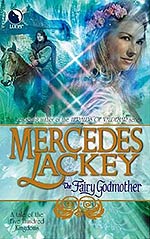
![]() AJ Sikes
AJ Sikes
9/14/2013
![]()
I recently read this blog post, which describes two kinds of book reviews. This review will be both kinds, a "did I like it" review and an "is it a well-written book" review.
First, is it a well-written book?
Answer: No. Not at all. The first 50% isn't anyway, and I gave up in disgust at that point, so maybe I missed something. Up to the halfway mark though, the prose was clumsy and overbalanced with telling rather than showing. The few scenes where the author managed to evoke a sense of activity or urgency, or...I don't know, tension of the sort that makes the protagonist's story something I could care about, well those were few. And very far between.
Lackey piles on description where it's unnecessary, where a brief mention of a scene setting detail would allow the reader enough insight to form a picture themselves. She uses backstory info dumps to fill entire chapters, only to have her protagonist, Elena, utter one or two words of dialogue at the end, as if summarizing the entire chapter's worth of information might somehow move the story forward. Repeatedly, throughout the half that I read, I had to make an effort to remember I was reading a book instead of letting my mind wander off into thoughts about what else I could be doing.
On a few occasions, startlingly lucid and suspenseful scenes appear in the narrative, and that gave me hope at first. I thought that maybe it would be a slow start that would payoff with a tension-filled 2nd act and a thrilling finale. But no. No, not one bit. Scene after scene, chapter after chapter, I was treated to info dumps, backstory filler, sparse and minimalist dialogue, action promised and never delivered. Also, inside of the first 100 pages I counted no fewer than a half dozen errors of grammar, spelling, and punctuation. Bad form, Luna (an imprint of Harlequin).
It feels like this is a book that could have used a much stronger editor. The first 100 pages are effectively backstory and forgettable. A big problem for me is that in the opening scenes, Elena details her torturous life as slave to her evil stepmother and the woman's daughters, whom Elena calls The Horribles. That set up was so emotionally compelling (I felt rage at the evil trio), and Lackey gets major points for knowing how to write antagonists. But then it went poof. The evil antagonists vanished from the narrative, which left me reading a book that seemed to have no point, no problem to solve.
Some good can be found here though. The world-building is first rate. Lackey clearly knows her world inside and out, and has done something exceedingly clever in building that world around the timeless stories of fairytale fiction. Casting the narratives themselves as characters of a sort, Lackey places her protagonist into a realm where eating the wrong apple or sticking yourself on a spinning needle can land you in a bad way, indeed. And woe be the woman who finds herself pregnant and wedded to a simpleton. She'll likely give birth to a girl child who will end up locked in a tower while men throw themselves into danger for a chance to climb her hair. There was plenty about the world that enchanted my imagination and made me want to enjoy the book, and made me keep looking for reasons to enjoy it.
But, did I like it?
Well, you know the answer to that, but there's more than my distaste for the quality of the writing at work here.
The Fairy Godmother is a misandrist's wish-fulfillment tale. For all the well-deserved critcism that male authors get for writing female characters as nothing more than window-dressing or thinly veiled stand-ins for the girl they never got, there are plenty of female authors who write from a "turnabout is fair play" stance, and at least with this book, Mercedes Lackey positions herself as one such author.
Male characters...let's see, are there any? Well, a few. The father who gets duped by Elena's evil stepmother. The aforementioned simpleton, who doesn't even get a single line of dialogue. Instead, in the most action-filled and exciting scene of the first half of the book, Elena confronts the man and then tells us that he said things in reply.
Other men in the story. There's the elder iron-willed and cold-hearted prince #1, a guy who could stand in as the father who never spoke to his daughter, or the tough as nails general on the battlefield. There's the sweet-natured and entirely foolhardy artistic young prince #3, who needs Elena's shepharding lest he fall victim to his own too large heart and dim wits.
And, finally, there's arrogant, boorish, haughty, snotty middel-child prince #2. We meet him at the halfway mark and it is instantly clear that he is the one whom Elena will save, redeem, and change for the better, leading to the HEA ending that all good fairytales claim.
The first thing Elena does, of course, is turn him into a donkey. In this state, he is treated to a good comeuppance, as all arrogant, boorish, haughty, snotty men deserve and must undergo lest they fail to appreciate just how much the women in their lives truly love them and want nothing but the best for them.
Seriously, it's like Story of O told by Disney, this book.